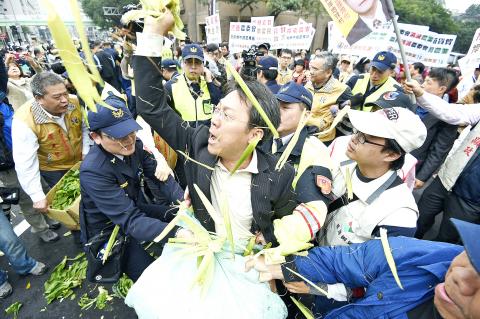The Taiwan Solidarity Union (TSU) yesterday led about 100 farmers in a rally in front of the Council of Agriculture’s headquarters in Taipei to protest a proposal to lift a ban on selected Chinese agricultural imports as part of a cross-strait trade in goods agreement under negotiation.
The protesters, mostly farmers from Hsinchu and Yilan counties, threw baskets of cabbage at the council buildings, which were heavily guarded by police, shouting: “Reject the trade in goods agreement. Protect farmers and agriculture.”
TSU Legislator Lai Chen-chang (賴振昌) said the Ministry of Economic Affairs promised to protect Taiwan’s agricultural industry from Chinese imports and would not sacrifice farmers’ interests in negotiations with China, but on Dec. 28 last year it went back on its promise and announced that it would be necessary to deregulate 90 percent of banned Chinese agricultural and fishery products, while tariffs on those products would be eliminated in 15 years.

Photo: Chen Chih-chu, Taipei Times
“The policy U-turn was President Ma Ying-jeou’s (馬英九) attempt to build a relationship with China by sacrificing Taiwan’s agriculture and farmers. How can the public tolerate such a deceitful government?” Lai said.
Imports of 615 Chinese agricultural and fishery products are banned to protect Taiwan’s industries.
Chilly Chen (陳峻涵), office director of the 908 Taiwan Republic Campaign, said lifting the ban on Chinese products endangers farmers’ livelihoods and puts national security at risk, as cheap Chinese imports, if allowed into the nation, would force farmers to let land lie fallow and lower Taiwan’s food self-sufficiency — which is about 30 percent — allowing Beijing to control Taiwan’s food supply.
TSU organization department deputy director Lee Cho-han (李卓翰) said that the party opposes any cross-strait negotiations prior to the passage of a proposed cross-strait agreement oversight bill, and that the Ma administration should not push for the deregulation just months before it leaves office, but should instead leave the matter to the next administration.
The ministry’s proposal to lift a ban on 90 percent of Chinese products is not focused solely on the agricultural sector, but is a combined goal for the agricultural and industrial sectors, Council Department of International Affairs Deputy Director Hsiao Tung-chung (蕭柊瓊) said, adding that the ministry said there would be more liberalization commitments for the industrial sector.
China is not asking for the total elimination of tariffs, but rather equal trade terms with those Taiwan accords to other WTO members, Hsiao said, adding that the council would make sure that Taiwan’s agriculture is protected, while it asks China to eliminate taxes on Taiwanese orchids and aquaculture exports.

Costa Rica sent a group of intelligence officials to Taiwan for a short-term training program, the first time the Central American country has done so since the countries ended official diplomatic relations in 2007, a Costa Rican media outlet reported last week. Five officials from the Costa Rican Directorate of Intelligence and Security last month spent 23 days in Taipei undergoing a series of training sessions focused on national security, La Nacion reported on Friday, quoting unnamed sources. The Costa Rican government has not confirmed the report. The Chinese embassy in Costa Rica protested the news, saying in a statement issued the same

Temperatures in New Taipei City’s Sindian District (新店) climbed past 37°C yesterday, as the Central Weather Administration (CWA) issued heat alerts for 16 municipalities, warning the public of intense heat expected across Taiwan. The hottest location in Taiwan was in Sindian, where the mercury reached 37.5°C at about 2pm, according to CWA data. Taipei’s Shilin District (士林) recorded a temperature of 37.4°C at noon, Taitung County’s Jinfeng Township (金峰) at 12:50 pm logged a temperature of 37.4°C and Miaoli County’s Toufen Township (頭份) reached 36.7°C at 11:40am, the CWA said. The weather agency yesterday issued a yellow level information notice for Taipei, New

Taiwan’s Liu Ming-i, right, who also goes by the name Ray Liu, poses with a Chinese Taipei flag after winning the gold medal in the men’s physique 170cm competition at the International Fitness and Bodybuilding Federation Asian Championship in Ajman, United Arab Emirates, yesterday.

A year-long renovation of Taipei’s Bangka Park (艋舺公園) began yesterday, as city workers fenced off the site and cleared out belongings left by homeless residents who had been living there. Despite protests from displaced residents, a city official defended the government’s relocation efforts, saying transitional housing has been offered. The renovation of the park in Taipei’s Wanhua District (萬華), near Longshan Temple (龍山寺), began at 9am yesterday, as about 20 homeless people packed their belongings and left after being asked to move by city personnel. Among them was a 90-year-old woman surnamed Wang (王), who last week said that she had no plans